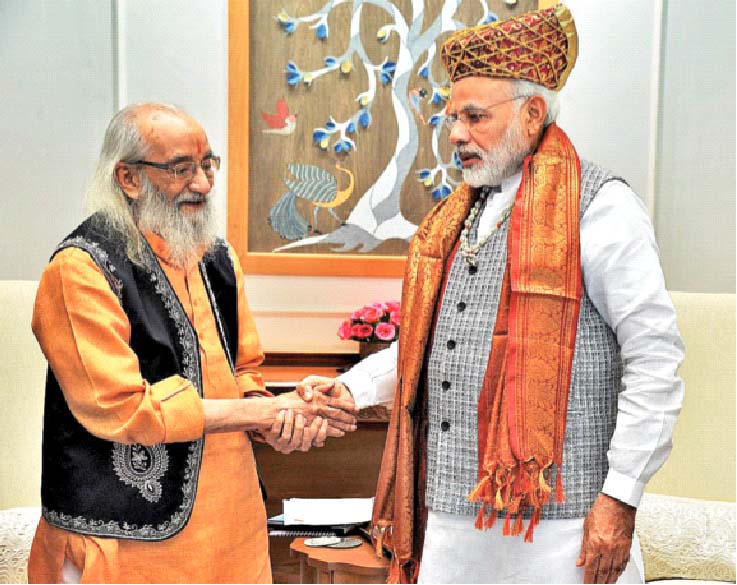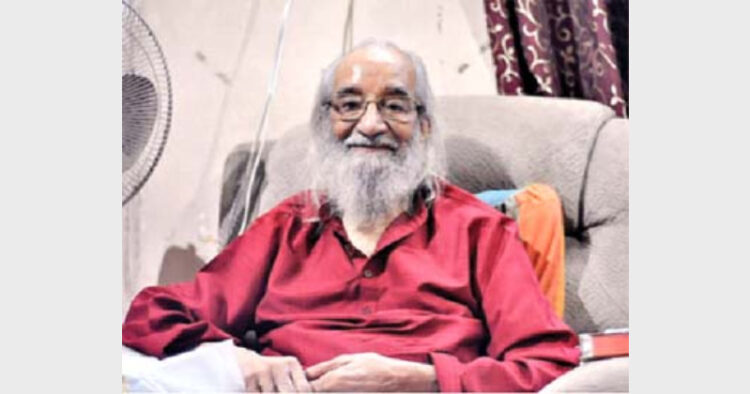Ever since ‘Janata Raja’ appeared on stage for the first time on April 15, 1985, it has caught the fascination of the Marathi people. The play depicts the life and work of Chhatrapati Shivaji and assumes a historical proportion in itself. It has been showed more than 1200 times during last three decades. While travelling and performing the play since 1985, the cast, crew and organisers faced many hurdles from language to constructing grand sets, which are an intrinsic part of the play. Add to it that everywhere the play is staged by local artists guided by the old ones. Many artists in the play rendered their acting skills without any remuneration just out of the love for Shivaji. Organiser representative Devidas Deshpandey spoke to the writer of the play Shivshahir Baba Saheb Purandare in Pune to know how he feels on first show of the mega play in Hindi. Excerpts
The ‘Janata Raja’ has travelled so far from a grand show to an inspiring legend. What would you say on this journey?
I do not want to take the entire credit for the stupendous success of the play. The real credit goes to the actors who have performed tirelessly for the last 30 years and to the people who erected sets and carried them from one city to another. Also, support from people who blessed it by seeing it so many times must also be appreciated. Ultimately, however, it is the magical word without which this journey would have been impossible and that word is ‘Shivaji’. It is a three-letter mantra that inspires us all even today.

The show has come a long way from being a passionate endeavour to a professional staging. For example, when we started, we didn’t have enough drapery for the artists. So, we asked the artists to bring their own constumes and they followed the instructions! It was the devotion of the concerned persons towards Shivaji that has brought it to such a height. There are no big names attached to it; most of the times there are local artists who carry the show. During the show, we never announce names of technicians, etc. and yet the play has attracted people year after year. It is because I was confident from day one that Shivacharitra (Shivaji's life story) is itself so wonderful and pious that we don't need any supplementary support.
How did the idea come to you for such a spectacular show with live elements thrown in?
We organised a grand exhibition titled ‘Shivsrushti’ in 1974 on the occasion of 300 years of Rajyabhishek (coronation) ceremony of Shivaji Maharaj. Replicas of Shivaji-era residences, buildings and forts were erected as part of that exhibition that also had an array of weaponry on display. There the idea came as to why there should not be a permanent exhibition showing the Rajyabhishek of Shivaji Maharaj in his full splendour and glory. Thus came the idea of this play. It eventually evolved from a 22-minute show to a full-fledged three-hour play. I had the script ready and I conveyed my idea of bringing it on the stage to the members of the Shivray Pratishthan. They expressed concern that it would be impossible financially and physically to show the life of Shivaji in three hours. But, I was adamant on doing it and today I think I was right.
What is the relevance of Chhatrapati Shivaji at present? Why is history so important?
Every generation has to develop its own national character to make our great nation even greater. Ideal values and ethics need to be instilled in our youth. Hence, the life history of Chhatrapati Shivaji Maharaj is one of the greatest sources from yore to achieve this colossal task. For us, history is the most valued national treasure. History is to society what memory is to the individual. It provides a sense of identity, helps us to make sense of the world and provides lessons in right and wrong. We can learn many national virtues and vices from our history providing us the much needed direction and impetus for transforming our nation into a prosperous, strong and proud country in the world. Our knowledge of history shapes the way we view the present, and therefore it dictates our future as well.
Shivaji has been depicted as a revered hero, as a consummate ruler, as an exemplary administrator and as a visionary statesman
The life of exemplary ruler and founder of Maratha empire – Chhatrapati Shivaji Maharaj changed the course of history in India during 17th century. His incredible fight for freedom against callous enemies of then India has inspired numerous lives. He has attained a widespread glory as the embodiment of virtue, valour and stature. He has been a peerless role model for patriotism for well over 350 years!
What does Shivaji's life teach us?
Propagation of history can be accomplished with the ultra-modern, up-to-date resources and new progressive ways and means. Shivaji Raje had the same vision when he established his rule in brutal conditions. His life history is there to inspire and guide us in this mission. This history is an inspiring tale of cautious politics, valour, progressive thinking, new ideas, industriousness, lofty character, vigilance and blotless governance, dedication, love and affection for the subjects and their service. The study of his life is as interesting as it is educative and inspiring.
How has the ‘Janata Raja’ been successful in impressing upon the message of Shivaji's life on people?
The drama is, after all, a reflection of the history and not the history itself. If you present a research paper on Shivaji, people may come to hear you but they won’t go away with any impression at all. Life history of Chhatrapati Shivaji Maharaj has a potential to stimulate and inspire every generation to build glorious future and create a new history. Therefore, the play depicts him as a revered hero, as a consummate ruler, as an exemplary administrator, and as a visionary statesman. The play is full of elements that imbibe values on the audience but there is no overt dramatisation – whatever is there is a truth. And most importantly, his inspiring story should be related in every house, to every mother, to every child and to every infant in the country!














Comments